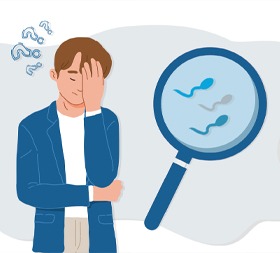Asthenozoospermia is a medical condition that affects male fertility, characterized by decreased sperm motility or movement. This condition can make it difficult for couples to conceive naturally. In this blog post, we will discuss the causes, symptoms, and Ayurvedic treatment options for asthenozoospermia.
What is Asthenospermia?
Asthenospermia is an infertility condition in which a man experiences low sperm motility. Sperm motility describes the ability of sperm to “swim” through the female reproductive tract in order to reach the egg. Asthenozoospermia is a condition in which a man’s sperm have zero motility.
Asthenospermia can significantly reduce the chances of achieving pregnancy and is one of the most common causes of infertility in men (oligospermia, with low sperm count). Asthenospermia is defined as sperm motility less than 40% or progressive motility less than 32%. Progressive motility refers to the movement of sperm in straight lines or large circles.
Causes of Asthenozoospermia:
Several factors can contribute to asthenozoospermia, including hormonal imbalances, nutritional deficiencies, lifestyle factors, and underlying medical conditions. Here are some of the common causes of asthenozoospermia:
Hormonal imbalances: Hormones play a crucial role in the production and movement of sperm. Low levels of testosterone or thyroid hormones can impact sperm motility.
Nutritional deficiencies: Adequate levels of vitamins and minerals such as zinc, folate, and vitamin C are essential for healthy sperm production and motility. Deficiencies in these nutrients can lead to asthenozoospermia.
Lifestyle factors: Unhealthy habits such as smoking, alcohol consumption, and drug use can negatively impact sperm motility. Lack of exercise, obesity, and high-stress levels can also contribute to asthenozoospermia.
Underlying medical conditions: Medical conditions such as varicocele, infections, and genetic abnormalities can affect sperm motility.
Symptoms of Asthenozoospermia:
The primary symptom of asthenozoospermia is reduced sperm motility, which can make it challenging to conceive naturally. However, in some cases, men with asthenozoospermia may not experience any noticeable symptoms. A semen analysis is typically performed to diagnose the condition.
Ayurvedic Treatment for Asthenozoospermia:
Ayurvedic treatments can help improve sperm motility and overall reproductive health. Here are some of the Ayurvedic treatment options for asthenozoospermia:
Herbal supplements: Ayurvedic practitioners may recommend herbal supplements such as ashwagandha, shatavari, and gokshura to improve sperm motility and overall reproductive health.
Dietary changes: Eating a healthy, balanced diet that includes nutrient-rich foods such as fruits, vegetables, and whole grains can improve sperm motility. Avoiding processed foods, high-fat foods, and sugary drinks can also be helpful.
Lifestyle modifications: Engaging in regular exercise, reducing stress levels, and avoiding unhealthy habits such as smoking and excessive alcohol consumption can improve sperm motility.
Panchakarma: Panchakarma is an Ayurvedic therapy that involves a series of detoxification procedures to remove toxins from the body. This therapy can help improve reproductive health and sperm motility.
In addition to the above Ayurvedic treatments, it is essential to consult with a qualified Ayurvedic practitioner to develop a personalized treatment plan based on the underlying cause of asthenozoospermia.
In conclusion, asthenozoospermia can make it challenging for couples to conceive naturally. However, with the right treatment plan, it is possible to improve sperm motility and overall reproductive health. Ayurvedic treatments, along with lifestyle modifications and dietary changes, can help improve sperm motility and increase the chances of natural conception. It is crucial to consult with a qualified healthcare provider to determine the underlying cause of asthenozoospermia and to develop an effective treatment plan.

